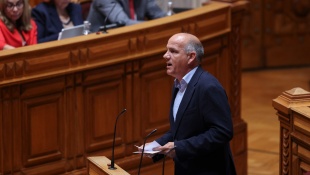The Country has the means and resources that are essential to strengthen public services. Fiscal justice is therefore necessary to reduce taxes on low and middle incomes and micro, small and medium-sized enterprises, and tax the profits of large economic groups and multinationals. A policy is needed to tackle the scandalous favouritism shown to economic groups.
In the scope of the discussion of the State Budget for 2026, the PCP today submitted 15 proposals that demonstrate that fiscal justice and combating tax evasion are possible.
Taxation of profits of economic groups
The PCP proposes restoring the corporate income tax rate to 21% and making it progressive, at 12.5% on the first €15,000 of taxable income, while maintaining the current rate of 15% on taxable income above €15,000 and below €50,000.
It is proposed to increase the State Surtax for large companies with taxable profits exceeding €50 million per annum, corresponding to 5% of profits above that amount. Around 70 companies are in the highest tax bracket.
Although they operate in Portugal, where they generate profits, many economic groups have their tax headquarters outside the country, thus evading tax payments by resorting to a wide range of exemptions. To ensure the effective taxation of these groups and multinationals in the country, the PCP proposes the repeal of the exemptions that allow such evasion and tax privileges, ensuring that all profits generated in Portugal are taxed under IRC (corporate income tax).
It also proposes revoking tax benefits for economic and financial groups. It should be noted that IRC benefits only serve to further increase the profits of large groups, depriving the State of €1.8 billion in revenue.
The PCP also proposes a 0.8% tax on movable assets (shares, bonds, bank deposits and other financial products) worth more than €1 million, which are not taxed in Portugal. This measure will raise €500 million in tax from the wealthiest strata of society and introduce greater fiscal justice, fulfilling the redistributive function of taxes.
Fight tax evasion
Capital flight to tax havens – which supports tax avoidance, fraud and tax evasion – deprives the country of important resources. In 2023 alone, almost seven billion euros were transferred to tax havens or offshore centres. In 2024, this figure reached at least €8 billion. Advocating restrictions on these practices, which strongly harm the country, the PCP proposes the creation of a special 35% tax on transfers to offshore centres, to discourage them and guarantee State funding resources.
Portugal is becoming a tax haven for crypto assets, an activity that is not even based on or indexed to any sovereign debt or any part of a company's capital, such as money or shares. The PCP proposes the taxation of capital gains from crypto asset transactions and clarification in the Penal Code that their use in illegal activities (computer fraud, trafficking, pimping, criminal association, money laundering, etc.) constitutes a punishable offence.
IRS: more justice for those who work
The PCP proposes updating the specific deduction for the IRS (personal income tax) to €5,424 (amount deducted from taxable income), taking into account the 31.43% cumulative inflation between 2010 and 2024 (29.03) and the estimated inflation for 2025 (2.4%) to recover from the devaluation caused by the long wage freeze. Given the progressivity of the tax, it covers income up to the 6th. bracket but is more significant for low and intermediate labour income.
On the other hand, it is proposed that capital and real estate income be mandatorily included for taxpayers with taxable income above €83,696 per annum, i.e. from the 9th. bracket onwards. It is not fair that income of this magnitude should be taxed at lower rates than labour income in the 6th.bracket.
It proposes the creation of a 10th. bracket for incomes above €250,000 and to integrate into the IRS structure the additional solidarity tax (TAS) already in force for incomes above €80,000, in the 9th. and 10th. brackets, increasing the IRS rate applicable to these incomes by three percentage points.
It also proposes the update of the amounts of taxable income for IRS purposes to 4.6% – and not 3.51%, as the Government did.
Food, energy, telecommunications and fuel: fairer VAT
The proposed amendments to the Value Added Tax Code aim to promote greater tax fairness by reducing indirect taxes, which weigh heavily on low-income families in particular.
The VAT rate is to be set at 6% for all food, electricity, natural gas, gas cylinders and telecommunications.
The existence of a “tax that pays tax” is equally unacceptable, with VAT being paid on the Tax on Petroleum and Energy Products (ISP), a double taxation that penalises consumers. By proposing the elimination of this double taxation of the ISP, the PCP is helping to address the high price of fuel, but stresses that the solution lies in price regulation and public control of the sector.
Lower taxation for MSMEs
Most MSMEs do not make enough profit to be taxed under IRC, but they are subject to autonomous taxation, which means a tax on the means essential to economic activity, even if they do not make a profit.
To address the difficulties faced by thousands of companies, the PCP proposes an extraordinary relief scheme of 15% on autonomous taxation relating to MSME vehicles and exemption for the first vehicle purchased.
It also proposes the resumption of the rule suspending the unfair increase in autonomous taxation, by ten percentage points, for companies with tax losses.
End public-private partnerships and the privatisation of TAP
The PCP proposes the reversal to the State of public-private partnership contracts in the road, rail and healthcare sectors, which should be implemented by the Government in 2026, putting an end to this actual drain on public resources, which in the State budget for 2026 amounts to more than €1.5 billion.
The PCP also proposes cancelling the privatisation process of TAP, given the strategic nature of the company, which is fundamental to the country's development and sovereignty and one of the largest national exporters, a company respected globally for the quality and safety of its operations.
It is imperative to abandon this ruinous project and stop harming the company. It is urgent to provide TAP with the necessary means to better fulfil its strategic role in the development of the economy and national production, in territorial cohesion, in connecting with the diaspora, and in diversifying economic relations and cooperation with other peoples.
These are proposals that allow the State to collect more revenue, with greater fiscal justice, providing it with the means and resources to respond to the problems that affect the lives of the workers, pensioners and people, while at the same time combating the systematic favouring of economic groups.



